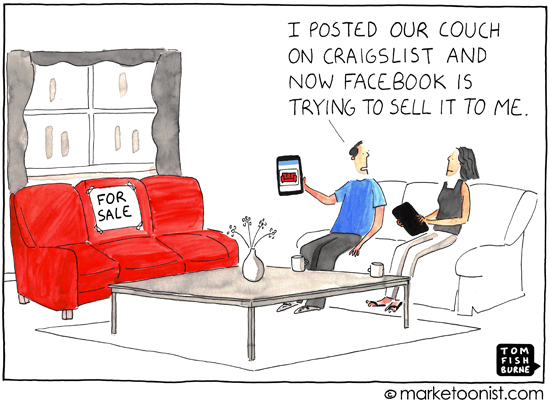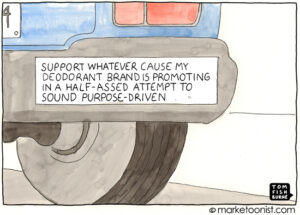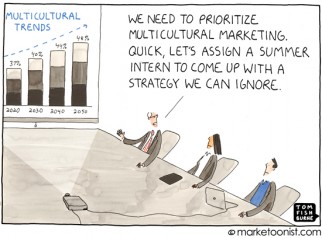If you have the feeling that ads are stalking you more than ever, you’re right.
Facebook pioneered advertising based on social signals (clicking “Like us on Facebook”). Recently they’ve embraced old-school ad retargeting too. Ads are popping up in news feeds and sidebars not just based on Likes, but also because of other websites users visited in the past. Twitter recently announced a similar move.
Ad retargeting has been in the marketer’s toolkit for years. Visiting websites is a signal of intent. That can result in better targeted and more productive ads. But it’s a blunt instrument. Not every website visit means that you want to make a purchase. Also, cookies are not the same as people. If you lend your laptop to your seven-year old daughter, get ready to be targeted as a seven-year old.
As ad targeting gets more sophisticated, in theory this will create a better ad experiences for everyone: the right message to the right audience at the right time. But in the meantime, there will be a lot of experimentation to divine true intent and customize marketing messages to match that intent.
Marketers will also face increasing consumer backlash against stalking. Some consumers are wary of being tracked in such a granular way. Browsers like Mozilla are stepping in to make it easier to delete cookies. In the offline world, Target was caught trying to predict which of its customers were newly pregnant. One man found out his teenage daughter was pregnant because of a Target mailer based on her purchases of Q-tips and other not-so-obvious products.
I’d love to hear your thoughts on where we’re headed with ad retargeting and customized advertising in general.
Also, this week’s cartoon was inspired by an email from a couple readers (who wanted to stay anonymous). I’m sending them cartoon prints as thanks. Please let me know if you ever think a marketing topic would make a good cartoon. Thanks!
(Marketoonist Monday: I’m giving away a signed print of this week’s cartoon. Just share an insightful comment to this week’s post by 5:00 PST on Monday. Thanks!)



srinin says
‘ads are stalking you’ – nice and accurate expression of my feelings at times! As a person who hardly buys anything unless it is needed, I am perhaps an oddball. The only impulsive buying I can confess to are perhaps books (for myself and friends) and toys for kids in the family and friends. So when Facebook started ‘infiltrating’ in serious discussions on cricket (a game Indians are passionate about) in an cricket only group, it was at once strange and annoying. O even reported that as spam to the admins! (Naive me!) Until I realised it is not group member but a Facebook insertion to enhance its revenue potential. What beats me is that how the ad men can forget that that when I am discussing cricket I am hardly in the mood to know about the latest book on sale about Kant or Camus. I not only ignore it but consider it a positive intrusion and makes me subconsciously forget the title. Isn’t it all down to something very elementary and common sense that everything has its place and time? Admen need to know not only what I like but WHEN I like them. This may call for more research before they can unleash their experiments on us.
Bill Carlson says
I don’t really like the “e-eavesdropping”… The amount that is known about me because of my online actions is creepy. I did a search recently (using Yahoo or whatever, nothing unusual) for products related to a business project and now I’m frequently seeing ads for those types of products. So I suppose if I read the really tiny type in some “terms” document somewhere, I would find that in exchange for my “free use of search tools” I have agreed that the search provider can share (sell, actually!) what I’ve searched for.
The idea that advertising ROI will improve because it’s more targeted, i.e. making offers that are more relevant to the recipient, may sound good to marketers but sounds like a violation of privacy to me as a consumer.
I’m sure there will be some issues along the way but all in all, how does it hurt us? As a practical matter, probably not much, but the issue for marketers is a bigger one — it’s an issue of “principle”. Our right to privacy, like our “right to bear arms”, is one of those philosophical issue which gets really tough to talk us out of…
Phil J says
Advertising is going to happen anyway – I’d rather there was some level of intelligence applied so that at least there is a greater chance that I’m actually interested in the product.
sno says
I’m wondering … perhaps hoping … if consumers react to retargeted ads for services or high-dollar “considered” purchases differently than they do to ads following them around the interwebs for retail goods like shoes or pet grooming supplies? Is it as alarming to be delivered ads for private Mediterranean cruises after you search travel sites as it is to see ads for the sandals you were just reviewing but didn’t purchase? What about education ads after someone searches on “online education degree” or investment company ads after a search on “Roth IRA maximums?” Is all of it equally creepy to users? If yes, why does the tactic result in higher interaction over time?
I’ve seen decent-to-drastic increases in click through rates for retargeted ads over the first-run ads. But in the world of deriving success based on improvements in the hundredths of a percentage point, does it actually mean they are working? And, is it worth reminding consumers that they really are being watched all the time?
In a world where the success of my department is based on conversions of web visitors into sales then of course it’s worth it.
Charles Cousins says
I may get slammed for making this comparison, but isn’t this within a hair’s breadth of the controversy surrounding the government spying on potential terrorists? The range varies quite a bit when you are being targeted for casino ads (why me? I never go to casinos, or visit online gambling sites? Hmm…), vs the government doing research into your online activities. I do realize that one is a much more targeted and invasive, but the basics don’t seem to be that much different. Someone is using information about you. Is it worse for one reason vs another?
T Watson says
It seems that as individuals, we are uncomfortable with all the “ad stalking,” but as marketers we just call it strategy. There is no intelligence behind the waves of spam and ads that show up in my email and on my computer. I long ago gave up the idea of any privacy left, but it doesn’t mean I like it. It is creepy and intrusive and annoying and there’s no end in sight, only more intrusion. Thank heaven for DELETE buttons!
McSteve says
Maybe we need better setup or opt-in & -out features in browsers, OSes or the cloud such as: an over-arching app (probably called “Big Brother’s Ad Options”) that allows two extremes and many settings in-between: those who are paranoid select ‘automatically delete and disable all cookies per session, etc.’ so these folks can (attempt) mimicking a “virgin” browsing experience for every session. Thus, those feeding the ads don’t know if you’re a 7 year old, a 77 year old, or web-crawling robot software.
The other extreme allows the software to track your every move – even across applications – and, via customizable preferences, permits, for example, tracking the fact that you browsed and eventually purchased product XYZ – yet now that the software knows you bought an XYZ, no more ads for this specific item appear. From your volunteered preferences you’re fed the stuff you like. As an incentive for volunteering your hobbies and preferences, vendors give you discounts on things you like via the ads.
This would be an extension of the Amazon recommendations features but the scope would work across more than one website, application and device. Perhaps this is a Cloud-based app? I’m sure there are already many things like this, yet haven’t searched.
Finally, to cause harm to your competitors, you could write software that acts like a browser, finds all your competitor’s ads, then “clicks” them so competitors spend on click-through totals skyrocket. Devious, yet probably already in place too.
chris says
This is a great post because it highlights how using cookies is an after thought to a process that has nothing to do with brand, end consumers or relevance
online advertising is crude, its interruptions. The reason people dont like it is because it has nothing to do with the people being hit, its all to do with budgets and graphs:
A campaign with a large budget, like a new car, comes to an end with spare advertising cash, so they spend it on online ads to use up the last of this cash. because its a last minute kind of thing to make the numbers, the ‘creative’ is fudged from print material forcing into odd banner shapes.
The car companies (or the agency they paid to advertise for them) love it because it gives them data on who clicked, how many saw it etc. the kind of thing you dont get with TV or print. It gives the company/agency a nice graph to show at the end. It has nothing to do with sales or relevance for a consumer. Thats why online adverts suck so much.
I know this because i worked for a short period as a ‘designer’ producing banner adverts. Its a pile of nonsense run by people who think they are being clever or targeting because their systems spit out a graph that print cant. Its lowest common denominator nonsense.
tomfishburne says
Hi all,
Great feedback this week. Many thanks! This week’s winner is Sno.
-Tom
Meredith says
Recently Facebook has been running ads across the top of my newsfeed saying something like Things you Are Interest In. Out of approximately 50 ads, not ONE SINGLE ONE has been even remotely close to any interest of mine. Pretty poor targeting.